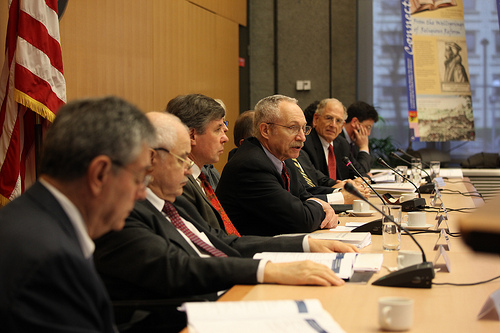
Panel at the Global Challenges Forum – Image Credit: Eric Bridiers, US Mission Geneva
Last week I attended the latest installment of the Global Challenges Forum, held in Geneva and co-chaired by the U.S. Naval Postgraduate School (NPS) and the Talal Abu-Ghazaleh Organization. Here is what NPS says about this effort:
The specifics of the presentations and discussions were off the record, but I can report that an impressive group of people were assigned to take on a wide variety of challenges that face international organizations, governments, universities, NGOs and corporations. In addition to analyzing the substance of the overarching global issues of the day,the Forum also engaged in the hard work of wrestling with how it can make a real difference by developing multidisciplinary analyses that offer actionable options to key policymakers at the highest levels. The process offers as many challenges as the substance of the issues. How to set the agenda and decide what issues to address? How to make the analyses cross-cutting without being watered down? How to ensure that they can get directly to policymakers without the power of the message being filtered out by national and international political concerns? These questions, among others,were discussed in a systematic and productive manner, which is no mean feat.
Some immediate substantive issues were front and center at the meeting, such as the global economic crisis. Other more conceptual matters underpinned the entire meeting (ie, that the international system is still pitching and yawing in the wake of the end of the Cold War). But this is a group that has the real potential to be able to work across borders, disciplines and types of institutions. Clearly, this is not the only effort of this sort underway, but it is one that is diverse enough to be representative but small enough to actually produce objective and actionable analyses. In addition, the communication among Forum members has a value in and of itself and I am certain that additional partnerships will be formed and research projects implemented. Stay tuned for more from this promising effort.